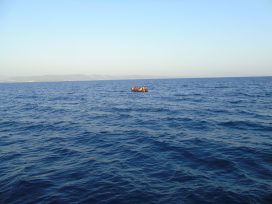
Baltic-German queer
Vikerkaar 3/2024
Queer histories in Estonia(n): featuring 19th-century writing defying heteronormative expectations; why ‘cis-gender’ is a useless concept; Russian-speaking LGBT+ activism; and a history of trans rights in Spain.
Well-known journalist Danica Vucenic asks herself how she should bring up her daughter. “Not only what I’ll tell her, but if I’m going to teach her to bravely ask questions one day. I’m not sure that the generation Slavenka Drakulic talks about is ready for that.”
I was touched by the article by Slavenka Drakulic and the first thing that came to my mind is the historical value of the Hague tribunal, where military and political leaders in Serbia and SFRY stand trial for the crimes in Kosovo. A question arises, though, as to how it is to be commented on here, and if it is going to have any impact on our attitudes to those crimes. These trials are our “Nuremberg” and it is remains to be seen in which context the verdicts will be put. Will they force us to face what we did, or will they be put in a daily-political context like everything else, such as the politicized references to the trials in The Hague and the Kosovo issue? In other words, how are these verdicts going to influence forthcoming cases in the International Court of Justice?
This is a question of interpretation of everything that refers to our past and accordingly the constant aspiration to belittle everything.
The topic Slavenka Drakulic addresses in her article is the topic I faced while shooting a movie in Germany about how the Germans confronted their Nazi past. It was then that I learned for the first time how much the confrontation was influenced by the year 1968, a year which here we learned was one of student riots and exclusively student rebellions against the authorities. Yet children asked their parents in these countries: “What did you do in the past, how could you have done it, and why have you remained silent up to now?”
I have no problems with Croats, Albanians, Bosniaks. I have problems with myself, respectively with us. My parents had a house on the island Cres1 and I used to spend my summers there. Last time I went there was as the war broke out and haven’t returned since then. Not because I have no friends there, we still keep in touch. My sister went and told me that they spent three days crying. My problem in going there is not because of them, but because I don’t know what would I tell them, if they asked – and they would ask. It is not enough to say: it wasn’t me. The problem is multilayered. The problem lies in belittling. It is not enough for the president of a country to say: “I have apologized.” He has to clearly say what the apology means.
Does the apology also mean “but also the crimes committed against Serbs”, or not? Willy Brandt gathered all his strength to fall to his knees before a monument to the victims of the Warsaw Ghetto. The question is if the Germans were in an inferior position after the Second World War, and that is the question the majority of the Germans asked. They felt frustrated, they told me. The question is when our children are going to ask us: “What did you do?” My daughter is seven years old and I ask myself how I’m going to bring her up. Not only what I’ll tell her, but if I’m going to teach her to bravely ask questions one day. I’m not sure that the generation Slavenka Drakulic talks about is ready for that. They grew up in the 1990s and they weren’t brought up to ask questions. We are, as always, dealing with the feeling of others. I want to deal with my own feelings with regard to my own past. The problem our neighbours have is that they faced their own past; my problem is that we still have to face and explain what happened in Srebrenica or in Kosovo. Unfortunately, we always have this “but”.
Off the Croatian coast -- trans.
Published 3 April 2009
Original in Serbian
Translated by
Alma Memic-Avdic
First published by Politika 28.03.2009 (Serbian version)
© Danica Vucenic / Eurozine
PDF/PRINTSubscribe to know what’s worth thinking about.

Queer histories in Estonia(n): featuring 19th-century writing defying heteronormative expectations; why ‘cis-gender’ is a useless concept; Russian-speaking LGBT+ activism; and a history of trans rights in Spain.

From migration to foreign policy, Europe has undergone an identitarian shift. Both far-right politicians and pro-European voices are framing external influences as civilizational threats, reviving the link between Europe and whiteness.